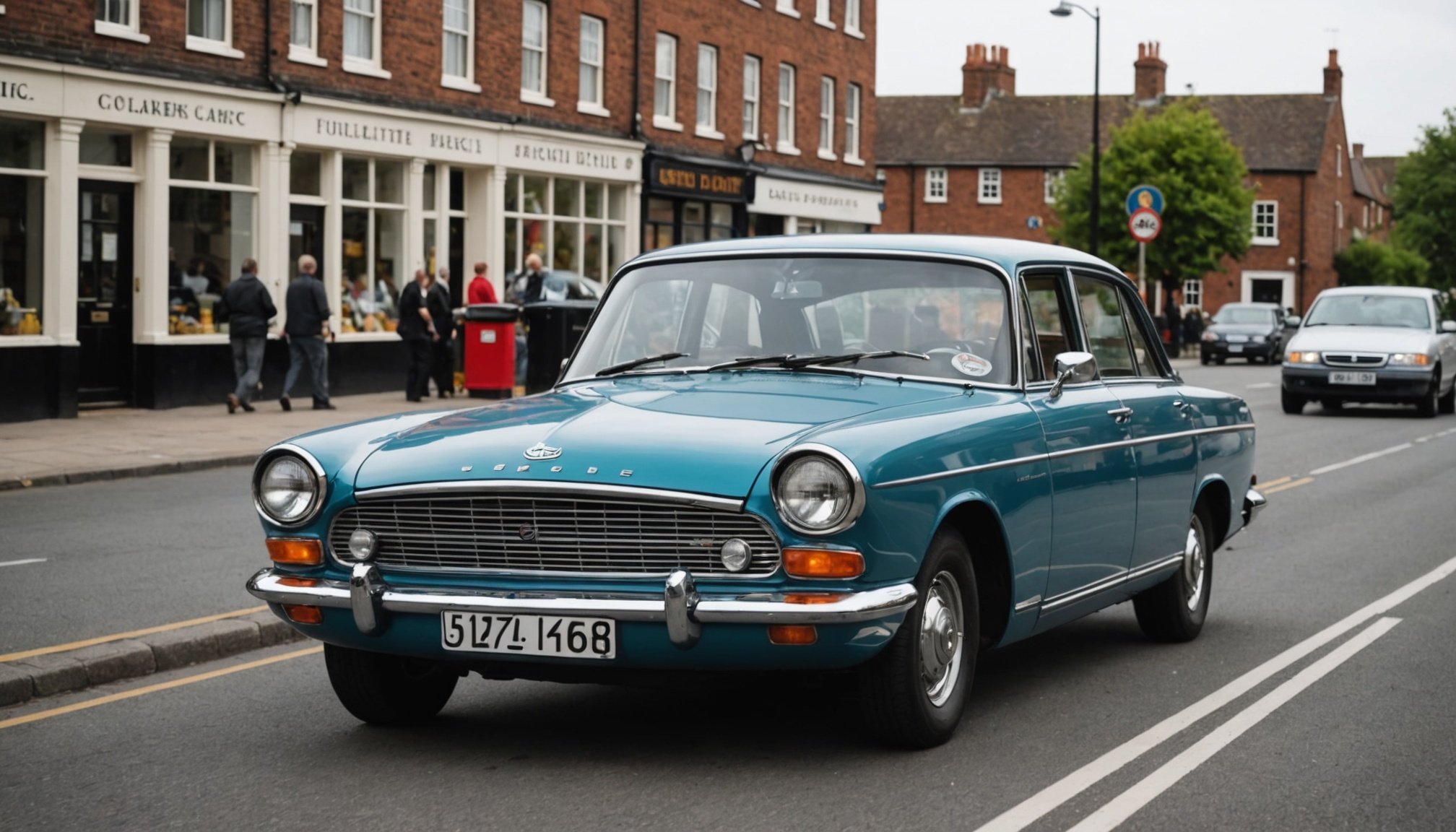Understanding Fuel Efficiency in Classic British Diesel Cars
The development of diesel engines in classic British cars is intimately tied to the nation’s storied automotive history. Diesel technology, initially prized for efficiency and reliability, gained prominence in Britain due to its economic advantages over petrol engines, especially important during eras of fuel rationing and economic austerity.
Fuel efficiency is more than just a concern for modern vehicles; it is a critical point of interest for classic car enthusiasts who wish to maintain their vehicles’ authentic charm while also ensuring practical usability. Understanding the complex interplay of engine dynamics, weight, and driving techniques is vital for assessing how these classic models perform in today’s context.
Topic to read : Transforming vintage uk autos: your ultimate guide to selecting and installing cutting-edge bluetooth audio systems
Common fuel efficiency metrics, such as miles per gallon (MPG), help classic car owners gauge their vehicle’s performance. These metrics are foundational to diagnosing issues and determining whether certain driving habits or mechanical modifications can yield improvements. Classic British diesel cars often exhibit different efficiency patterns due to their vintage design and technology, making it essential for enthusiasts to delve into these specifics to optimise their fuel economy effectively.
Driving Techniques to Maximize Mileage
Understanding how to reduce fuel consumption through strategic driving techniques is essential for optimising the mileage of classic diesel cars. A key practice involves smooth acceleration and braking. Gradually increasing speed and gently applying brakes minimizes energy waste and improves fuel efficiency. Rapid acceleration and harsh braking, on the other hand, lead to higher fuel consumption and wear on the vehicle.
Additional reading : Unveiling top strategies for ensuring wheel alignment accuracy in british vehicles
Maintaining consistent speeds is another vital technique. Continuous speed fluctuations, especially in urban settings, can significantly increase fuel use. Driving smoothly, with lower speed variability, supports better fuel efficiency. This is where cruise control technology becomes invaluable. Used effectively, cruise control can help sustain a steady pace, particularly advantageous on long journeys.
Incorporating these driving habits not only enhances economic driving but also prolongs the life of classic diesel cars’ engines by reducing unnecessary strain. Engaging in these adaptive driving styles ensures that enthusiasts can enjoy their classic beauties with an improved balance of performance and practicality, aligning well with the traditions of British automotive history.
Regular Maintenance for Enhanced Performance
Ensuring regular vehicle maintenance is crucial for maintaining and enhancing the performance of classic British diesel cars. Routine maintenance not only preserves the diesel engine’s longevity but also optimises fuel efficiency, aligning with the vehicle’s heritage.
Focus on key tasks specific to these engines. Consistent oil changes are essential, as they reduce friction and wear, enhancing overall engine efficiency. Replace the fuel filter regularly to prevent dirt and debris from affecting fuel flow, crucial for maintaining optimal combustion and mileage.
Tire pressure and alignment play significant roles in the vehicle’s driving performance. Incorrect tire pressure can lead to increased rolling resistance, negatively impacting fuel efficiency. Regular checks and adjustments ensure the car runs smoothly and efficiently.
Lastly, always adhere to a structured maintenance schedule. This not only supports the vehicle’s fuel economy but also preserves its charm and functionality. Classic car enthusiasts need to prioritise these tasks, integrating them into everyday care to enjoy their classic beauties at their best.
Modifications to Improve Fuel Efficiency
When considering modifications for classic British diesel cars, there are several options that can enhance performance while respecting their storied heritage. One effective approach involves using lighter materials in vehicle components. Replacing heavy, outdated parts with aluminium or carbon fibre alternatives can significantly reduce the vehicle’s weight, boosting fuel efficiency without compromising structural integrity or historical authenticity.
Another impactful modification is the integration of modern components designed for efficiency. Upgrading to a contemporary, high-performance air intake system allows for better airflow and combustion efficiency, which in turn improves overall fuel consumption. Similarly, modern fuel injectors can provide more precise fuel delivery, enhancing both power and economy.
Considering upgrades to the exhaust system can lead to noticeable improvements in performance. Installing a more advanced exhaust mechanism reduces back pressure, facilitating smoother engine operation and enhanced fuel efficiency. It’s critical, however, to balance these upgrades with the desire to maintain the car’s vintage appeal, ensuring that modifications are sympathetic to its classic identity. Adapting these strategies provides enthusiasts with practical solutions to enjoy their classic vehicles with improved fuel economy.
Real-World Case Studies and User Experiences
Compiling success stories and detailed user testimonials reveals the practical side of enhancing fuel efficiency in classic British diesel cars. Enthusiasts often share innovative practices that have significantly improved their vehicle mileage, showcasing real-world results rather than theoretical estimations. Such testimonials highlight the impact of strategic modifications and maintenance routines discussed in previous sections.
For example, an owner of a 1970s British diesel model reported a 15% improvement in fuel economy after adopting smoother driving techniques and upgrading to a high-performance air intake system. This case study serves as a testament to how specific changes can lead to tangible benefits.
Moreover, analyses of different models post-implementation of recommended tips show varied yet universally positive outcomes. A common trend is noticeable: vehicles with integrated modern components, like enhanced fuel injectors, consistently demonstrate better performance. These practical results underscore the importance of balancing classic car heritage with modern efficiency practices. Engaging with these user experiences provides valuable insights for others seeking to optimise their classic beauties while preserving their vintage appeal.
Future Technologies and Their Potential Impact
Innovations in future technologies are poised to reshape the landscape of classic British diesel cars. Automotive advancements continue to evolve, promising improved fuel efficiency through cutting-edge approaches. One notable area of exploration is diesel alternatives, which offer environmentally friendly options while aiming to maintain performance standards.
Alternative fuel options, such as biofuels and synthetic fuels, provide an eco-conscious choice for classic vehicles. These fuels reduce carbon emissions and rely less on fossil fuels, aligning with global sustainability goals. By adopting such alternatives, classic car owners can strike a balance between environmental responsibility and preserving automotive heritage.
Promising advancements in fuel technology include the development of hybrid systems that blend traditional diesel engines with electric components. This fusion optimises efficiency and enhances power delivery, making it a viable option for enthusiasts keen on modernising their cars while retaining their classic allure.
As technologies advance, classic car owners face the challenge of integrating these innovations without compromising the essence of their vehicles. Nevertheless, these developments offer countless opportunities to enhance the longevity and appeal of classic diesel cars, ensuring they remain relevant and cherished in a progressively eco-conscious world.








